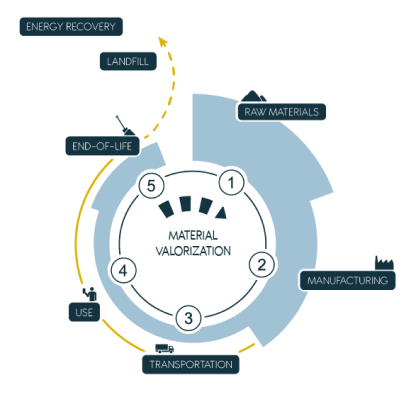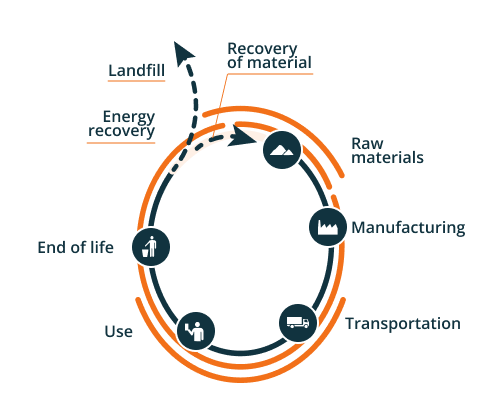At EVEA, we help you understand and assess your environmental and social impacts.
With deep expertise in cutting-edge analytical tools and methodologies, we work alongside you to accurately measure your impacts, identify key areas for improvement, and seamlessly integrate environmental and social considerations into your strategic decisions. Together, we create sustainable solutions that meet regulatory requirements and exceed stakeholder expectations.

Life Cycle Assessment (LCA) is a standardized method (ISO 14040 and 14044) used to evaluate the potential environmental impact of a product (or service, or activity) by assessing the physical flows of materials and energy throughout its life cycle.
Environmental LCA is a scientifically grounded method recognized and adopted by public institutions (such as ADEME, the European Commission, among others). It does have various limitations, insights into which our consultants are well-versed.

Most LCAs we conduct at LINEA are attributional LCAs. In other words, we analyze the impacts of a so-called "static" system, whether it be a tangible good or a service, at a given moment in time, without considering changes over the life cycle.
We also conduct consequential LCAs, where we analyze the impacts resulting from changes in the life cycle of the product or service compared to a reference life cycle, taking market dynamics into account. Consequential LCA is particularly utilized for research purposes, aiding in political or strategic decision-making for certain sectors.
A life cycle assessment is a wealth of information in itself. For an organisation, it can serve as both the starting point for reducing its environmental footprint and an extension of a broader environmental strategy.
Social Life Cycle Assessment (S-LCA or social LCA) is a method that allows for the assessment of social footprints, in other words, the social and socio-economic impacts of your products, services, or activities throughout their life cycle.
S-LCA aims to enhance the social performance of organisations and, ultimately, the well-being of stakeholders.

A GHG inventory also known as a carbon footprint, is an assessment of the total mass of greenhouse gases emitted or captured in the atmosphere over a year by an organization's activities.
These activities include those for which the organization is directly or indirectly responsible, as well as those on which it depends. In other words, one of the main goals of the GHG inventory is to understand both the responsibilities in terms of emissions and the dependencies of your activities on fossil fuels across the entire value chain.
Why conduct a BEGES?
Our Climate team is available to conduct your GHG inventory.
We can also help you understand your specific context and accompany you through your transformation (setting a direction, designing a trajectory). We can assist you in effectively communicating your results and sustaining your approach through team training or suitable software tools: TOOVALU, ASKOR.
Environmental footprints provide a thorough assessment of the impacts of a product, service, site, or organisation, based on the solid methodological foundation of Life Cycle Assessment (LCA). This approach integrates a detailed characterisation of impacts for specific issues and enhances the assessment with complementary, tailored indicators.
With our expertise, we support you in identifying and prioritising key issues related to ecosystem preservation, sustainable resource management, and the reduction of your environmental impacts. Our analyses are based on recognised standard frameworks and are enhanced by advanced environmental modelling assessments. With clear, customised indicators, we provide you with recommendations to improve the environmental performance of your activities, while meeting regulatory requirements and stakeholder expectations.
The FDES (Fiche de Déclaration Environnementale et Sanitaire) is like the environmental and health "ID card" for a construction or decoration product in France.
It describes the impact results of a product or construction material in the building sector, according to the NF EN 15804+A2 standard and its national complement, which are specific to French regulations. With a team of 20 consultants, including 3 auditors accredited by the INIES programme (a French certification scheme), EVEA’s expertise in this field is nationally recognised in France.
About FDESA PEP is a Product Environmental Profile
As an environmental identity card for products from companies and professions in the electrical, electronic, and HVAC (EEE) fields, the PEP is based on the results of a Life Cycle Assessment (LCA) of these products.
EVEA's proficiency in Product Environmental Profiles (PEP) is nationally recognised, thanks to the dedicated team of verifiers within its Construction Division.
About PEPAt EVEA, we support our clients in validating their life cycle assessment (LCA) studies and analytical tools, ensuring rigorous compliance with ISO 14040-44 and ISO 14071 standards. Our expertise guarantees that each project is underpinned by robust methodology, optimal transparency, and impeccable scientific quality.
For each critical review, our experts conduct an in-depth analysis of the client's deliverables, whether it be a study report or a specific tool (such as an Excel calculator or a web solution). This process includes detailed feedback and concrete recommendations to enhance the quality and compliance of the deliverable with ISO standards.
The critical review process typically involves 2 to 3 iterations, fostering iterative monitoring and constructive dialogue. At the conclusion of this process, EVEA provides a final report outlining the entire review, addressed comments, and a conclusion on the deliverable's compliance with ISO 14040-44 standards.
Engaging our critical review service ensures that your deliverable meets ISO standards, thereby enhancing the credibility and reliability of your results. Through this approach, you gain robust data and reliable results for transparent and reassuring communication with your stakeholders.
For construction products, our Construction team verifies the compliance of studies with standards such as NF EN 15804+A2. Beyond critical reviews, our certified verifiers perform verifications within specific programmes like PEP Ecopasseport or INIES.
The Project Footprint (PF) method is inspired by consequential life cycle analysis. Developed by ADEME, the French Agency for Ecological Transition. This method is increasingly required in the agency's tenders (ITTs) and calls for projects (CFPs).
EVEA specialises in conducting Project Footprints. We support you throughout the process, from conception to implementation, and can even train you in this method. Our expertise ensures a precise and comprehensive evaluation of the environmental and social impacts of your projects.
Double materiality assessment involves evaluating your organisation's impacts on the environment, as well as the effects of the environment on your organisation, in a reciprocal framework.
In other words, it is a strategic tool that enables you to analyse your priorities regarding environmental, social, and governance (ESG) issues with a broader perspective. This assessment is also central to the reporting requirements set by the European CSRD directive.
Want to learn more?
Contact us